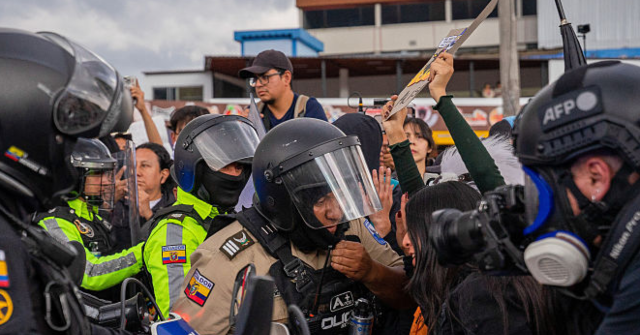Violent rioters in Ecuador on Sunday assaulted a convoy loaded with humanitarian aid led by President Daniel Noboa in the province of Imbabura amid fierce anti-government protests over the end of fuel subsidies, according to the Ecuadorian government.
Over the past week, Ecuador has undergone a series of violent protests, strikes, and blockades across some of its provinces led by the Confederation of Indigenous Nationalities of Ecuador (CONAIE) in response to President Noboa’s mid-September decision to end diesel fuel subsidies in the country. The violent protests have so far reportedly left one protester dead and 12 injured military officials.
On Sunday, President Noboa personally led a humanitarian convoy alongside other government officials and international representatives to the city of Otavalo, Imbabura, one of the municipalities most affected by the ongoing strikes and violent protests. Ecuadorian presidential spokesperson Carolina Jaramillo explained to local outlets on Monday that some 350 people ambushed the convoy, which was under the protection of some 50 military officials. Jaramillo described the violent protests as terrorist acts and stressed that “the attack came unexpectedly, and what the military did was repel it.”
The presidential spokesperson further detailed that, in addition to President Noboa, Interior Minister John Reimberg and Defense Minister Giancarlo Loffredo were also part of the convoy, as well as Catholic Apostolic Nuncio Andrés Carrascosa, European Union Ambassador Jekaterina Dorodnova, U.N. Resident Coordinator Laura Melo, and Italian Ambassador to Ecuador Giovanni Davoli.
“The president’s goal is to watch over and protect the lives of all Ecuadorians, but there are infiltrated groups that seek confrontation and do not represent the citizenry,” Jaramillo said, and stressed that the assault shows these are not peaceful demonstrations, but “crimes committed by violent and infiltrated groups.”
“The safety and lives of Ecuadorians are the priority. We reject violent attacks, the detention of public servants, and the destruction of public and private property. This is no longer protest: these are crimes,” she added.
President Noboa published footage and video of the assaulted humanitarian convoy on social media.
“They are resisting Ecuador’s progress and have chosen violence. Yesterday, [Sunday] they ambushed another humanitarian convoy in Otavalo, which I myself led alongside delegates from the U.N., the EU, the Italian ambassador, and the apostolic nuncio,” Noboa wrote. “They responded with violence. We will continue: Ecuador cannot back down.”
The Italian embassy in Ecuador released a statement on Monday evening condemning the terrorist attack against Noboa’s convoy and confirming that its ambassador was unharmed in the assault.
“Ambassador Davoli, who is in good health and unharmed, strongly condemns this terrorist act against the Ecuadorian Head of State and stresses that no violent political protest can be considered legitimate,” the statement read.
“Italy reaffirms its commitment to peace, dialogue, and the defense of the democratic principles that unite our peoples, and expresses its full solidarity with President Noboa and the democratic institutions of Ecuador, which are fundamental pillars of stability and peaceful coexistence in the nation,” the statement concluded.
President Noboa has defended his decision to end the diesel subsidies on the grounds that it allows the government to redistribute those financial resources into other investments and social programs while at the same time hindering the activities of illegal contraband and mining. Noboa has insisted he will not back down on his decision.
On Sunday, CONAIE leader Marlon Vargas declared that the indigenous organization will not “take a step back” and will continue the violent protests, holding Noboa responsible for the “chaos” that could happen in Ecuador if he does not reinstate the subsidies.
“Mr. President, if chaos ensues in Ecuador, you will be solely responsible. We do not want a repeat of 2019 and 2022. We are capable of fighting back,” Vargas said, referring to CONAIE protests against the preceding administrations of Guillermo Lasso and Lenín Moreno.
Ecuadorian outlets described the province of Imbabura as the epicenter of the ongoing violent protests against Noboa’s government, with most of its main access roads either partially or fully blocked.
On Monday morning, the Ecuadorian army confirmed that four out of 17 military officials kidnapped during the violent wave of Sunday protests in the Imbabura town of Cotacachi were released by the protesters. Álvaro Castillo, mayor of the Imbabura town of Ibarra, announced on Monday morning that government and indigenous representatives held their first encounter since the protests started, and hoped that “in the coming hours, definitive agreements will be reached and we will be able to work and move forward as normal.”
Christian K. Caruzo is a Venezuelan writer and documents life under socialism. You can follow him on Twitter here
Read the full article here
